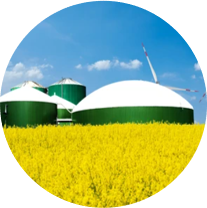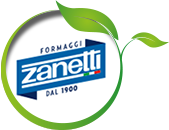Zanetti is convinced that the corporate responsibility is measured throughout the entire production chain and that an open communication is an essential tool to enable consumers to make informed purchasing decisions. For this reason, while not directly breeding the dairy cows itself, it Zanetti pays the utmost attention to animal breeding and welfare, and it’s therefore involved in several initiatives along the supply chain.
The Grana Padano P.D.O. production
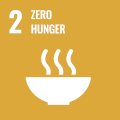
- Zanetti produces around 1,000 Grana Padano P.D.O. wheels per day
- Every day the Zanetti dairies receive over 530,000 liters of milk
- In addition to milk, Zanetti needs only three other ingredients for its production: salt, rennet and lysozyme.
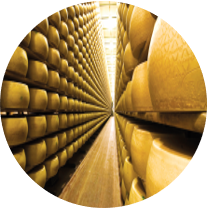
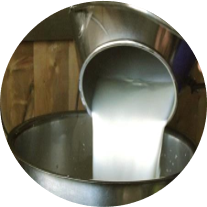
Milk from the surrounding territory
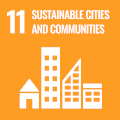
- Milk is collected from farms located no further than 60 km from the Zanetti dairies in Marmirolo e San Gervasio Bresciano
- Zanetti’s milk suppliers are deep-rooted in the territory and have been cooperating with Zanetti for approx. 45 years (some of them even for over a century!)
- Over 250 operators are involved in the production of milk
- The majority of Zanetti milk suppliers grow and produce the fodder and silage to feed their livestock
- The Milk Award is an economic acknowledgement assigned quarterly to all suppliers whose milk exceeds certain quality standards.
Animal welfare first and foremost
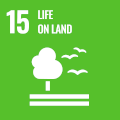
- 100% of Zanetti milk suppliers are certified to CReNBA animal welfare standards, which guarantees excellent living conditions and welfare of the livestock throughout the Grana Padano cheese supply chain.
- Zanetti only entertains trade relations with suppliers scoring over 60% in the CReNBA animal welfare.
- Zanetti’s milk suppliers are audited by the Grana Padano Consortium and the Public Veterinary Authority.
- Zanetti visits all its milk suppliers on a monthly basis to verify the conditions of hygiene and animal welfare, for a total of 1,400 inspections per year.
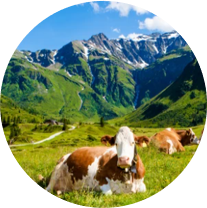
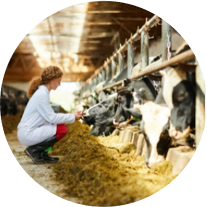
Environmental impact along the entire supply chain
As shown by the Life Cycle Assessment, the main environmental impacts connected to the Grana Padano supply chain refer to the milk production phase at the farm level (95,3%). This is why the involvement of milk suppliers on sustainability issues, along with the promotion of good practices, are crucial elements for the management of sustainability themes in the dairy sector. Some examples of good practices:
- Reuse of the water used to cool the milk containers.
- Use of energy from renewable sources and self-production from solar and photovoltaic panels
- Recovery of zootechnical waste for the production of fertilizer or energy from biogas
Nothing is wasted
- In addition to Grana Padano, Zanetti naturally obtains other by-products as a result of the cheese making process, such as cream and whey, destined for the production of food coproducts
- Within a perspective of circular economy, Zanetti also recovers various categories of discarded materials during the production process, from linen cloths used in the dairy process to by-products from the cheese production phase, so that are switched into new resources
- Cheese by-products such as powders or scraps are sent to independent companies handling biomass for the production of energy from renewable sources.
